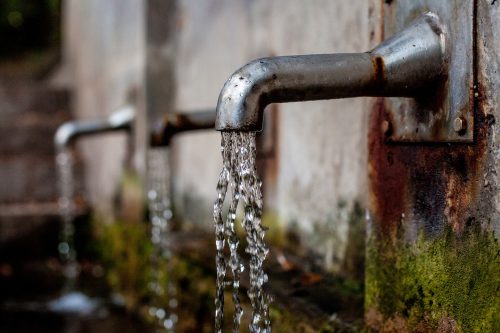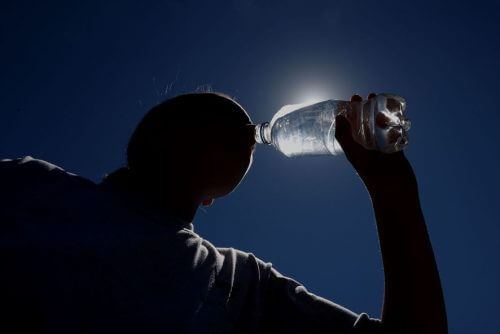On March 22, the International Water Day is "celebrated", but there is no doubt that it is not a holiday - as the state of potable water in the whole world is bad.

In the past I have already referred to a problem that comes up again and again regularly and continuously:
- The UN also states - we must find a solution to the world's water problem
- A special project for the knowledge site: mapping the world's water problems
The water supply in the world is dwindling to a dangerously low level. Today, about two billion people live in areas where there is a lack of water, and it is expected that by the year 2050, the number of thirsty people will reach about three billion. As the population grows, more water is needed for personal consumption, but more so for consumption in industry and agriculture (where a significant portion is required for growing and processing meat). At the same time, periods of dryness and drought are multiplying, which cause the level of the reservoirs to drop.
The issue of the lack of water in Cape Town in South Africa has become an example of the difficult situation in which many populations and cities around the world find themselves. If the situation in Cape Town is famous, then it is worth knowing that in some of the largest cities in the world, such as Jakarta, Sao Paulo, Mexico City, the residents face a similar situation - that is, the allocation of the amount of water for daily use to the point of lack of water.
When only 2.5% of the world's water is "fresh" found in rivers, lakes and aquas, but of that only one percent is available for use - the great difficulty becomes clear. The questions that are asked are how and why we came to a situation of lack of water and how the situation can be rectified and prevent the lack in the future.
It turns out that man "specialized" in harming water sources and polluting them. Deforestation is one of the most harmful activities that causes a lack of water. Therefore, it is clear that the felling must be stopped and forests renewed or planted that will store water and thus also prevent mud floods and the destruction of open areas.
Hydrologists distinguish between gray areas that are infrastructure such as dams and canals, and green areas such as woodlands, grasslands, or moist areas, hence one of the solutions is to increase the green areas in and around cities.
Groves and green areas are areas that absorb water and thus prevent surface flows, the absorbed water reaches aquas that are renewed. Intermittently, because of the warming there are more events of rain storms that cause intoxicating floods and pooling of flood water (also from roads in cities) will be an important source of supply.
Afforestation is just one example of how natural resources can be restored and thus improve the water supply. Supporting, renewing and restoring the natural environment will be only part of a general solution to the water problem. To this must be added the correct management of the available water. For example, there is evidence that wetlands and green areas are a cheap and sustainable source of water enrichment, more so than "gray" infrastructures such as dams or canals.
Water drained from agricultural or urban areas is "contaminated" with pollutants. Green infrastructures such as strips of vegetation planted along streams and rivers form filters that improve water quality. In cities that suffer from floods, the water is discharged into the sea (such as in our coastal cities), and this is a waste since the damage can be alleviated by canals with planted banks that will direct the water to drainage areas that will become wetlands.

There is no doubt that water is one of the most important resources in our world. It must be recognized that the need to protect populations from thirst is found in the natural environment.
The relationship between the human population and the natural environment is not easy. The entry into the anthropogenic period (Anthropocene) - in which the human population is a significant force in the stabilization (or destruction) of the natural environment - is also evident and especially in relation to water. Human intervention is felt in all water cycle (hydrological) systems. Changes in the use of land cause evaporation that affects the concentrations of water in the atmosphere, over-pumping of waters causes them to become salty, unintelligent use of water in industry causes pollution of water sources, changes in the topographical structure of areas cause floods and so on and so forth, the offensive changes continue and cause damage to the water system.
What can be done and how can the problem of lack of water be mitigated? Rainwater that reaches the ground is affected by human activities such as agriculture or infrastructure that affect the quantity and quality of available water. The correct approach is to work with nature, to manage the water systems as there is a necessity to balance the use and demand for water in a way that will be sustainable.
Although man cannot control storms, there is a possibility and a need to improve environmental systems, such as preparing "spongy" green areas that will absorb water around cities and thus the risk of floods will be reduced and the water system will improve. Green infrastructures such as parks/gardens improve the microclimate in settlements and thus improve the quality of life of residents.
We are, as mentioned, in a new geological period defined as anthropogenic. So that this period does not continue to be destructive to the environment and man, to allow the continued existence of human societies under reasonable conditions and without further damage to the environment, there is a vital and urgent need to manage the water systems and a smart combination of green and gray infrastructures is needed. It is also appropriate to incorporate biotechnology to purify water polluted by sewage and thus increase the amount of water available for use.
The management of water systems will always also depend on politics, therefore one of the important tasks of the International Water "Holiday" is to educate world leaders on the vital need and supreme importance of the natural resource called water.
After all that, one of the more correct ways to improve the global water economy would be - controlling the human population for the sake of the environment, instead of controlling the environment for the sake of the human population!
